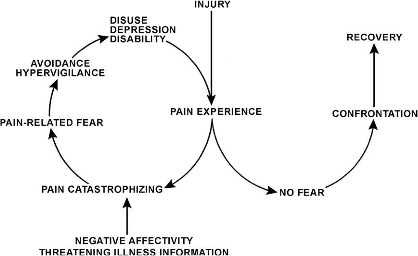
Personality, temperament, “soft-skills. “
There is a good amount of chatter in the world of pain science about these topics right now, related to both patients and to those who treat them. As we seek to determine who may benefit most from interventions like Pain Neuroscience Education (PNE), there very well may emerge certain personality traits, such as openness to change or optimism in addition to diagnosis-specific traits like central sensitization, which bode well for positive outcomes. It is well-established that patients who have high fear-avoidance and catastrophization struggle greatly to overcome pain and get on with their lives, and thanks to Dr. Vlaeyen and Dr. Linton we understand that negative affectivity is continuous fertilizer for keeping someone in the fear-avoidance cycle (Vlaeyen and Linton, 2000):

But what about physical therapists’ personality characteristics?
The more we understand and develop the characteristics that make an effective PT, and in particular, the characteristics which help foster therapeutic alliance, theoretically, the better outcomes we can expect, since therapeutic alliance is a predictor of patient outcomes (Hall, et al., Phys Ther, 2010). In a recent podcast, Doctors Kory Zimney, Tim Flynn and Jeff Moore had a thought-provoking conversation about the importance of trust as a fundamental element of therapeutic alliance.They spoke in particular about the soft-skills PTs must develop to create enough safety for the patient to be willing to risk changing behaviors to climb out of a cycle of chronic pain.After all, as Tim eloquently noted, patients are logical human beings, and when movement causes pain, they learn to avoid said movement.
How can we convince them that the very thing that scares them the most is what they will ultimately need to confront to move beyond their pain?
Clearly, trust is a cornerstone.And when we look at the soft-skills that build trust, is there a disconnect between the metrics that allow students to be accepted into PT school (good grades, high GRE scores, etc.) and the interpersonal skills requisite to connect on a human level to develop that kind of trust?
Being a non-Twitter-bug, I missed out on the terrific conversation that likely followed, but the podcast really got me thinking: what personality traits foster trust and facilitate success as a PT?Obviously, this is not a novel question.A quick perusal of Google yielded a few ideas.Justphysio.co.uk listed Team Player, Confidence, Adaptive, Patience and Drive as essential traits to succeed as a PT. Jobs.net described Cool and Determined, Supportive and Compassionate, Confident and Resilient, Fit and Health Conscious, and Sociable and Cooperative as essential characteristics.Their description of “Supportive and Compassionate” resonated with my own bias for crucial ingredients: “Individuals who maintain control of difficult sessions with empathy, tenderness and a sense of humor are among the most successful therapists.”Other sites listed qualities such as openness, life-long learner, competence and kindness.
As I pondered this further, I asked a good friend and colleague of mine, who has an amazing ability to make patients feel heard, important and safe what she thinks.”What makes the most trust-worthy PT?” Her answer:
“Presence. The ability to be truly present with the patient; to look them in the eyes; to hear what they are saying with both their words and their body-language; to have unconditional positive regard for them as a fellow human being.”
As I watched the passion in her expression while she said these things, and as I reflected on her interactions with patients, I thought, no wonder her patients do so well.She truly sees them, honors their dignity, and connects with them on a personal level. She has deep reverence for that “sacred space” we are given the privilege to enter when we come alongside a person who is going through one of the most difficult things known to humankind: suffering. And as I reflected on my observation of her personality, the first word that entered my mind was humility.
While these are all interesting, touchy-feely ideas and observations, I also had to consult the literature a bit, and in doing so I stumbled upon an intriguing little cohort study by a group of Dutch physiotherapists. The authors explored physiotherapists’ personality traits that may influence treatment outcome in patients with chronic diseases.They used The Big Five personality traits to see if there was a correlation between PT personality and patient outcomes.
While we might expect a correlation between some of these categories (particularly agreeableness, due to the elements of sensitivity and warmth), what these researchers found was rather interesting:
“Of the Big Five traits, Neuroticism [LOW scores on the neuroticism parameters] was the only personality trait that was associated with better treatment outcomes. This suggests that treatment by therapists who tend to be calmer, more relaxed, secure and hardy, may produce better treatment outcomes in patients with chronic diseases. The indication of the possible relevance of Neuroticism corresponds with evidence found in the field of psychotherapy, showing that being treated by secure therapists predicts a better outcome.”
The authors cited several limitations, including the fact that the majority of therapists in the sample were male, and that the Big Five Inventory lacks precision and is merely a measure of broad personality characteristics.Never-the-less, the idea that our own mental and emotional well-being as PTs may enhance the health of our patients is compelling.
Being low on neuroticism really struck me, and it reminded me of quotes from two PTs who I know and respect a great deal.One is a hero of pain science education and research, Adriaan Louw, who often tells PTs in his courses, “Keep your placebo cool.You freak out, they freak out.Stay calm.”The other is a good PT friend of mine locally, Bob Johnson, who has never taken a pain science class in his life, yet has over 30 years of experience and has phenomenal outcomes. Bob once told me, with kindness and gentleness in his voice, “I’ve come to think of myself not as Bob Johnson PT, but rather, Bob Johnson, queller of fears.”He views his job as a calling: to calm patients’ fears, to provide them with a sense of safety, and ultimately, to offer hope. As I look at the common thread between these two fantastic PTs, I see a characteristic that I think is essential, and is in line with the Dutch physio study: security. Adriaan and Bob are both secure in who they are and what they stand for. That sense of integrity, self-awareness and security allows them to interact with people (not just patients, but people in general) in a way that extends acceptance and grace to others regardless of their circumstances. They are able to keep it “about the patient,” instead of allowing themselves (i.e. their egos) to get in the way.
So, after pondering all of these ideas, I’m trying to decide what I would rank as my own “Big Five” personality traits for a PT, particularly a PT treating a patient population predominantly struggling with chronic pain. Trust-worthiness, humility, presence, security, and hopefulness? Empathy?
Maybe kindness, warmth, or emotional stability (i.e. anti-neuroticism)? So many options! What is your BIG FIVE list for characteristics of a relationally-successful PT? Is there a difference between those characteristics depending on the environment and/or patient population a therapist works with? And, not to open a whole new can of worms, but how on earth can we screen for those characteristics for admission into PT schools, develop them, and nurture them? I look forward to hearing your thoughts, and thank you Kory, Tim and Jeff for getting this conversation started!

––– Comments
Jessie Podolak
Commented • July 22, 2017
Hi Jill! Excited to see you are working on your tDPT! And I'm so excited to see these topics reinforced between your coursework and our social media chatter. And yes, Dr. Benz's points you are referring to are so critical to serving our patients well. You are on a great journey, and you came in to it strong, as you possess so many of the traits I hold in high regard in terms of connecting: empathy, humility, and a really high degree of emotional intelligence. I just started reading a book that Dr. Benz recommended called Humility is the New Smart. It's goooooood!! In all that free time of yours (ha!!!) you may want to check it out! Warm Regards, Jessie
Jessie Podolak
Commented • July 16, 2017
Awesome!!! I like the idea that it is much like empathy, but with the emotion removed. Looking forward to reading the book. Thank you, Larry!
Larry
Commented • July 16, 2017
I recommend the book Humility is the New Smart. Here is a briefing on the psychological research on IH-there is a ton! http://nymag.com/scienceofus/2017/02/how-intellectual-humility-can-make-you-a-better-person.html
Jill Lawrence MSPT, TPS
Commented • July 16, 2017
Jessie - great reflections. This has been a recent conversation in our private practice group re: "what it takes" to utilize and incorporate PNE successfully. Is there a way to create a competency level for clinicians in our practice was the question? In addition to the Top 5, I reflect on a recent excellent ecture as part of my EIM tDPT program by Larry Benz PT re: Placebo vs Nocebo and how to enhance placebo effects to positively influence outcomes. The conversations are so similar and so relevant on the skills necessary. Positivity and positive framing of information shared, ability to shape patient expectations, understanding patient's preferences, ability to create logic and clarity in communication, personal responsibility for constant learning... Blessed to be part of the conversations and on a personal journey to improve/grow in this area in order to better serve patients. The art of medicine not doubt lies in the "Soft skills".
Heather Sieler
Commented • July 15, 2017
I forgot to mention that I got the idea about the importance of being authentic and genuine from the same podcast you alluded to from "Pain Reframed" with Kory Zimney. I think it is just absolutely key with establishing an exceptional therapeutic alliance with out patients.
Heather Sieler
Commented • July 15, 2017
I absolutely love the concept and concise phrase of "being present." It is so spot on, and IMHO, critical in establishing an ideal patient alliance. I think another big one in being genuine and authentic to our patients. I think it serves as a foundation to build trust, but also helps us relate to our patients more on the same level. Love your comments, and love the topic!
Jessie Podolak
Commented • July 14, 2017
Hi Amy, Nice to have you join in the conversation, and thanks for your kind words! I think you make an excellent point about setting our computers aside to make eye contact with the patient and to be fully present. I try to do this whenever possible, and on those days when my schedule is such that point of service documentation is my only choice, I will still ask a patient's permission: "Is it okay with you if I jot some notes down in the computer while we talk?" Just acknowledging that we see the less than ideal side of computer documentation and ASKING permission seems to build a bridge at times. I hope you are enjoying the fruits of your labor as you incorporate the TOS material into your practice! Take Care, Jessie
Amy Simmons
Commented • July 14, 2017
Jessie- I have only met you a couple of time through the TPS program, but after I read this article and scrolled to the top to see who had written this great piece, your name was the first that popped into my head. Thank you for sharing this. I had coffee this morning with my girlfriend who is a PT who has been doing PT for lots of years like I have. She commented how she rolled her eyes in PT school when lectures on motivational interviewing (not called that then) and models of behavior change were rolled out, but she now feels a key in PT is helping someone / motivating someone to make a change. I think that in order to do that you have to have all of your top 5. I think these traits apply to all PT's. Great question about screening for schools and nurturing in therapists. My quick thoughts: I need to start with making sure I am in a good place physically and emotionally at work so that I can care for others and focus on them. I need to keep to paper on evaluations (instead of being behind my computer) to improve my listening and look at further growth in the personality traits that will make me a better PT. Thanks for starting a thought process for me.
Jessie Podolak
Commented • July 12, 2017
Hi Beth, Here is info on the Big Five: https://en.wikipedia.org/wiki/Big_Five_personality_traits Here is the Dutch study using the Big Five: http://bmchealthservres.biomedcentral.com/articles/10.1186/s12913-015-1225-1 Best Wishes, Jessie
Beth Jones
Commented • July 12, 2017
What is the reference of the Big Five PT study please?
Jessie Podolak
Commented • July 11, 2017
Awesome list, Larry! I love that the "secret sauce" of empathy is represented, as that has resonated with me for a long time (thank you!). I'm especially intrigued by "intellectual humility." Do you have a favorite article or book that explores this concept that you would direct me to? Jessie
Larry
Commented • July 11, 2017
If a 6th is allowed, I would add intrinsically motivated
Larry
Commented • July 11, 2017
Great post. Not in any order and all supported by various research: 1. Empathy, particularly ingredient of compassion 2. Intellectual humility (lots of good research) 3. Emotional intelligence 4. Likeability (connect with others, engagement) 5. Skilled listening. All of these have some overlap yet have distinct competencies